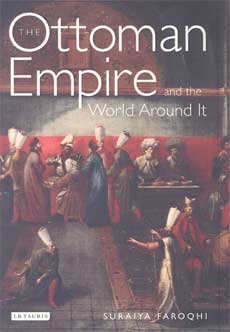| Éditeur : I.B.Tauris | Date & Lieu : 2004, New York |
| Préface : | Pages : 290 |
| Traduction : | ISBN : 1-85043-715-7 |
| Langue : Anglais | Format : 160x220 mm |
| Thème : Histoire |
|
Présentation
|
Table des Matières | Introduction | Identité | ||
 THE OTTOMAN EMPIRE AND THE WORLD AROUND IT A note on transliteration and dates Where there exists an accepted English name for a city or region, this has been preferred, i.e. ‘Aleppo’ as opposed to ‘Halep’ or alab’, ‘Syria’ as opposed to ‘Şām’. | |||||
| Acknowledgements Many colleagues and students have helped in the preparation of this book, and as the Turkish saying goes ‘however much I thank them it will be too little’. A large part of the writing was done while I was a fellow at the Wissenschaftskolleg zu Berlin in 2001–2. I owe a great debt to the other fellows, who did much to enlarge my horizons, but particularly to Gesine Bottomley and her team, who obtained books for me whenever I wanted them, and were ever ready to locate outlandish bibliographical information. Mitchell Cohen contributed his expertise as an editor. Barbara Sanders of the secretariat as well as Wiebke Güse and Petra Sonnenberg of the computer department helped to process the correspondence this manuscript occasioned, ironed out word processing problems and upon occasion, patiently listened to the lamentations without which no book apparently gets written. Back in Munich, Yavuz Köse has been a tower of strength; without his efficiency, I do not think I could have written very much, given the university bureaucracy that seems to increase in inverse proportion to the means actually available for historical research. The Library of the American Research Institute in Turkey (ARIT/Istanbul) furnished some books I had not been able to find elsewhere; thanks to Anthony Greenwood and Gülden Güneri. During the weeks that I was based in Istanbul, Pınar Kesen most graciously helped with the editing; and last but not least, I have Christoph Knüttel to thank for his aid with the index, and Yvonne Grossmann for drawing the maps. Too numerous to list are the colleagues who have supplied me with material and good advice, and I crave the pardon of anyone that I may have forgotten. Virginia Aksan provided me with insights into the problems of war and peace from the Ottoman perspective, particularly by allowing me to read her as yet unpublished manuscript. Stephanos Boulaisikis, Nikolas Pissis and Anna Vlachopoulos introduced me to Greek travel accounts and translated modern Greek texts for me. Penelope Stathe, Marie Elisabeth Mitsou and Albrecht Berger provided further information on this – to me – arcane subject. Many thanks for that and for their overall interest in the emerging work. To Maria Pia Pedani Fabris, I am grateful for sharing her profound knowledge of the documents in the Venetian archives, and above all for a copy of the relazioni that she has edited, all but impossible to locate otherwise as the publisher has gone out of business. Without the help of Minna Rozen, I would not have known anything about the Jewish travellers whose silhouettes fleetingly appear on the pages of this book, while Ina Baghdiantz McCabe has provided pointers to the accounts of Armenian travellers available in translation. To Nicolas Vatin, I am much obliged for letting me read his article on illegal enslavement in the Ottoman realm before it actually appeared in print, while Enis Batur has presented me with several publications put out by Yapı ve Kredi Yayınları: my heartiest thanks. Vera Costantini has generously provided information on the Cyprus war, but perhaps more importantly, contributed much through her laughter and love of life. In addition, there are the people who have read the manuscript and tried very hard to make it into a better book; if I did not take all of their excellent advice, I have no one to blame but myself. Apart from an anonymous reader, whose incisive criticisms I have done my special best to take into account, I extend my warmest thanks to Virginia Aksan, Robert Dankoff, Christopher Hann and Ildikó Béller-Hann, Leslie Peirce, Gilles Veinstein and above all, Christoph Neumann, whose patience has been almost without limits. At I. B. Tauris, Lester Crook has been a most understanding editor, providing tea and endless sympathy when accommodating my intrusions and listening to my follies. All these people have made time in their busy schedules in order to respond to me and my queries, and I can only hope that they will find the results acceptable at least to some degree. | ||||